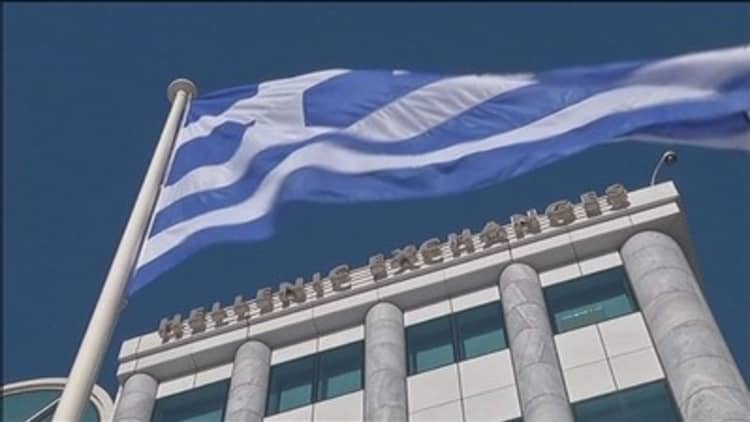
Greece and its lenders have agreed on the technical details of a third bailout, a spokesperson for the European Commission confirmed Tuesday, but a political agreement still needs to be secured.
Speaking at the Commission's midday press briefing, Annika Breidthardt, spokesperson for Economic and Financial Affairs, told reporters that technical talks had been concluded late last night.
While a bailout was "agreed in principle on a technical level…the Commission won't comment on other details until political agreement is reached," she said.
"Nothing is agreed until everything is agreed. We've had an agreement in principle," she said, although she remained tight-lipped about the details still to be ironed-out.
The president of the Commission, Jean-Claude Juncker, was talking to teams on the ground in Greece, she said, and would talkto German Chancellor Angela Merkel and French President Francois Hollande.
Greece and its lenders have agreed the terms of a new bailout, a Greek Finance Ministry official told CNBC.
The official, who asked to remain anonymous, told CNBC that an agreement had been reached and there were some "minor details" left to be discussed.
"The negotiations were completed this morning, there are some minor details left but it's nothing special. These details do not affect the completion of the deal," the official said on Tuesday.
Also on Tuesday, Greek government spokesperson, Theodoras Mihopoulos, tweeted: "Negotiations have been completed. There are some details left."
Craig Erlam, senior market analyst at currency trading company OANDA, said the news was a positive step, although he remained cautious.
"Of course, we've heard this all before so shouldn't get carried away until we've had official confirmation but it all sounds very promising," he said in a research note.
"It's very unusual for talks between Greece and its creditors to go so smoothly, which may straight away raise skepticism among some investors. If true, then Greek ministers could pass the bailout throughout parliament on Thursday leaving finance ministers to give it their backing on Friday, comfortably before the 20 August deadline when Greece must pay 3.2 billion euros to the European Central Bank."
A spokesperson for the European Commission said it would comment on the deal at its midday briefing Tuesday.
Earlier, Reuters reported that the two groups had reached a deal on the indebted country's fiscal targets, which would see Greece aiming for a surplus from 2016.
Read MoreCould Greek talks actually beat a deadline?
Greece and its lenders had been in talks to agree around 86 billion euros in fresh loans – a payment the country desperately needs ahead of the debt repayment comes due to the ECB next week.
The Commission would not confirm the exact size of the bailout package, but a Greek Finance Ministry official cited by Reuters on Tuesday said that it would be worth 85 billion euros ($93.7 billion) and spread over three years.
Greece needs to new loans so it can work on local parliamentary approval for aid, which must be completed before the ECB payment is made.
Earlier on Tuesday, a Greek government official told Reuters that the two sides had agreed on a wealth fund to handle privatizations, and how to address non-performing loans in its banking sector.
Harris Ikonomopoulos, president of the British Hellenic Chambers of Commerce, based in Athens, was positive about the progress regarding the bailout.
"It is extremely important because it's a necessary step to restoring normality. The economy in Greece has been in intensive care over the past couple of months, with no liquidity, no banking system, capital controls and a huge drop in confidence," he told CNBC on Tuesday.
He was skeptical about whether the bailout would resolve Greece's long-term problems, however.
"Whether it's the right deal or not (is another matter)," he said.
"I think it's a set of steps towards the right deal but major issues remain unresolved, for instance, the liberation of the labor market."
He added: "Greece doesn't need an election every six months or every year, this needs to be dealt with, We need a government that will have a steady term."
This story is developing. Please check back for further updates.
for the latest on the markets.


